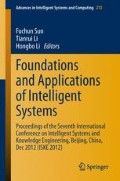Abstract
From the point of view of algebraic logic, this paper presents an algebraic analysis for binary intuitionistic lattice-valued fuzzy relations based on lattice implication algebras, which is a kind of lattice-valued propositional logical algebras. By defining suitable operations, we prove that the set of all binary intuitionistic lattice-valued fuzzy relations is a lattice-valued relation algebra, and some important properties are also obtained. This research shows that the algebraic description is advantageous to studying of structure of intuitionistic fuzzy relations.
Access this chapter
Tax calculation will be finalised at checkout
Purchases are for personal use only
References
Atanassov K, Stoeva S (1984) Intuitionistic L-fuzzy sets. In: Trappl R (ed) Cybernetics and Systems Research 2. Elsevier, Amsterdam, pp 539–540
Atanassov K (1984) Intuitionistic fuzzy relations. In: Antonov L (ed) Proceedings of the Third international symposium on automation and scientific instrumentation. Varna, vol II:56–57
Atanassov K (1986) Intuitionistic fuzzy sets. Fuzzy Sets Syst 20:87–96
Burillo P, Bustince H (1995) Intuitionistic fuzzy relations (Part I). Mathware Soft Comput 2:5–38
Burillo P, Bustince H (1995) Intuitionistic fuzzy relations (Part II). Mathware Soft Comput 2:117–148
Deschrijver G, Kerre EE (2003) On the composition of intuitionistic fuzzy relations. Fuzzy Sets Syst 136:333–361
Furusawa H (1998) Algebraic Formalisations of Fuzzy Relations and their Representation Theorems. Kyushu University, PhD-Thesis
Furusawa H, Kawahara Y, Winter M (2011) Dedekind Categories with cutoff operators. Fuzzy Sets Syst 173:1–24
Goguen JA (1967) L-fuzzy sets. J Math Anal Appl 18:145–157
Halmos P, Givant SR (1998) Logic as algebra. The Mathematical Association of America, Washington, D.C.
Hwang CM, Yang MS, Hung WL et al (2012) A similarity measure of intuitionistic fuzzy sets based on the Sugeno integral with its application to pattern recognition. Inf Sci 189:93–109
Kawahara Y, Furusawa H (1999) An algebraic formalization of fuzzy relations. Fuzzy Sets Syst 101:125–135
Li DF (2005) Multiattribute decision making models and methods using intuitionistic fuzzy sets. J Comput Syst Sci 70:73–85
Pan XD, Xu Y (2013) On the algebraic structure of binary lattice-valued fuzzy relations. Soft Computing 17:411–420
Pan XD, Xu Y (2010) Semantic theory of finite lattice-valued propositional logic. sci china. Inf Sci 53:2022–2031
Popescu A (2005) Many-valued relation algebras. Algebra Univers 53:73–108
Popescu A (2007) Some algebraic theory for many-valued relation algebras. Algebra Univers 56:211–235
Tarski A (1941) On the calculus of relations. J Symbolic Logic 6:73–89
Winter M (2001) A new algebraic approach to L-fuzzy relations convenient to study crispness. Inf Sci 139:233–252
Winter M (2003) Representation Theory of Goguen Categories. Fuzzy Sets Syst 1:339–357
Winter M (2003) Goguen categories. J Relat Methods Comput Sci 138:85–126
Xu Y, Ruan D, Qin KY, Liu J (2003) Lattice-valued logic-an alternative approach to treat fuzziness and incomparability. Springer, Berlin
Xu ZS, Yager RR (2006) Some geometric aggregation operators based on intuitionistic fuzzy sets. Int J Gen Syst 35:417–433
Zadeh LA (1965) Fuzzy sets. Inf. Control 8:338–353
Acknowledgments
The work was partially supported by the National Natural Science Foundation of China (Grant No. 61100046, 61175055) and the application fundamental research plan project of Sichuan Province (Grant No. 2011JY0092), and the Fundamental Research Funds for the Central Universities (Grant No. SWJTU12CX054, SWJTU12ZT14).
Author information
Authors and Affiliations
Corresponding author
Editor information
Editors and Affiliations
Rights and permissions
Copyright information
© 2014 Springer-Verlag Berlin Heidelberg
About this paper
Cite this paper
Pan, X., Xu, P. (2014). An Algebraic Analysis for Binary Intuitionistic L-Fuzzy Relations. In: Sun, F., Li, T., Li, H. (eds) Foundations and Applications of Intelligent Systems. Advances in Intelligent Systems and Computing, vol 213. Springer, Berlin, Heidelberg. https://doi.org/10.1007/978-3-642-37829-4_2
Download citation
DOI: https://doi.org/10.1007/978-3-642-37829-4_2
Published:
Publisher Name: Springer, Berlin, Heidelberg
Print ISBN: 978-3-642-37828-7
Online ISBN: 978-3-642-37829-4
eBook Packages: EngineeringEngineering (R0)

